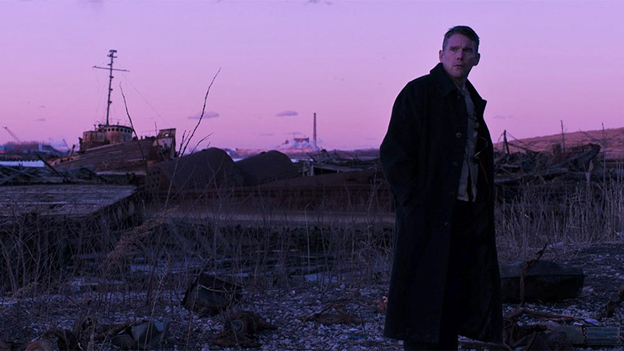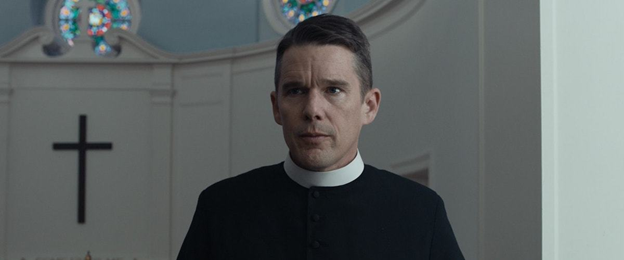This article previously appeared on Crossfader
Director: Paul Schrader
Genre: Drama
Year: 2018
I’ve recently been wrestling with the purpose of nihilistic cinema. I don’t know where it fits into the contemporary sociopolitical narrative. If films have served the purpose of escapist entertainment for well around a century, how do we handle cynicism? What is its mechanical purpose? Can it change the world? How do audiences process it? I really don’t know if I can fully answer this question, but I think that hints at its potential strength. The average viewer doesn’t want to consume two hours of gloom, but when butts are in seats, these films can be cultural game changers.
What I do know is that nihilism in filmmaking has bore witness to consistent critical acclaim. I’m not necessarily talking about the likes of THE BIG LEBOWSKI and REQUIEM FOR A DREAM (these find a steady footing in entertainment regardless of their cynicism), but rather films in the ilk of THE DEATH OF MR. LAZARESCU: works that permeate a slow, overwhelmingly defeatist attitude. As beloved as these films remain in critics’ circles, it’s almost impossible for them to find acknowledgement among laymen viewers. Where Paul Schrader’s FIRST REFORMED fits into this discourse is icky to say the least, a film that utilizes dejection as a breeding ground for empathy.

Following several cataclysmic months in the life of a small-town pastor, FIRST REFORMED paints a deliberate, piecemeal query on forgiveness amidst unrelenting chaos. It’s a work that Schrader presents with a deafening accuracy; performances just a little off-kilter—a stylistic template lifted straight out of a Lynch film—and camera angles stubbornly rigid. Ethan Hawke delivers a career-best performance, elevating the film tremendously. Every stilted, stuttered, neurotic conversation reads less like Schrader’s attempt at mimicking a small-town New York reality, and more like a downbeat alcoholic’s reading of it, fake appearances et al.
Hawke’s reverend Toller is an army man who lost his child to the darkness of modern America—dying an unjust death in an illogical war—and blames the cards he has been dealt on nobody but himself. Ironically, this leads him to priesthood, an avenue where many of life’s cruelties can be attributed to the will of God. The fact that Hawke opts into this lifestyle, serving sage advice to fellow Christians, but applying none of the same teachings to himself, serves as a wonderful foundation for the moral tapestry of his character—don’t let the underlying comedy of the film’s inversions pass you by. Through a relationship with a pregnant environmentalist and her suicidal husband, Hawke’s psyche slowly unravels, opening his eyes to the depths of God’s forgiveness, and whether or not he has truly found something to live for.

See, what’s most compelling about FIRST REFORMED is how interesting it is. Frankly, that’s a word I’ve almost never used in a film review, and it goes to show that Schrader has more to say about contemporary society than many of his peers. The fact of the matter remains that FIRST REFORMED can often come across as amateurish and haphazard. I’d wager that many of its oddities are intentional, but the fact that Schrader never loses his grasp on his viewer serves as a testament to the strength of his ideological quandaries. At its core, FIRST REFORMED is a film about a man finding something to live for after unspeakable trauma, whether its the church, environmentalism, or love, Schrader begs the question as to which of these—if any—can save the soul of man who has lost his will to live.
When deconstructed, FIRST REFORMED is ultimately a study of worth, a film that analyzes the virtues of kinship in the savagely unforgiving epoch that is modern America. It is, despite all of its hopelessness, a work of deep empathy. I’d bet that much of its kindness would’ve been absent had Schrader not been 71 years of age at the time of its creation. There is a kindness and wisdom that permeates through its wretched exterior that works as a delicate counterbalance to the film’s seemingly unending despair. It’s a sermon on purpose and individuality, lifting one’s spirits through nauseating anguish and despondency.
Verdict: Recommend















Comments